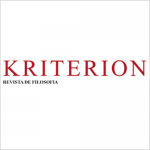FILOSOFIA DA ARTE E ARTE DE FILOSOFAR. ARTE, LINGUAGEM E RELIGIÃO EM FICHTE E SCHELLING (1807-1812)
Kriterion, v. 56, n. 132 (2015) • Kriterion: Revista de Filosofia
Autor: Federico Ferraguto
Resumo:
Este trabalho desenvolve aspectos da controvérsia entre Fichte e Schelling em relação aos elementos estéticos, linguístico-filosóficos e da filosofia da religião de ambos, que é foco das “Investigações sobre a liberdade humana de Schelling”, assim como das exposições da doutrina da ciência e da ética do Fichte tardio (1810-1813). As divergências entre Fichte e Schelling não envolvem apenas problemas especulativos, mas sim variadas implicações e consequências dos seus sistemas filosóficos, que podem ser destacadas por uma análise da função da analogia nos dois autores. A analogia é uma figura que agrega a estética, a filosofia da linguagem e a filosofia da religião nos dois autores; ela é um significante que põe o problema do significado, ou seja, põe o problema da relação entre finito e infinito (Schelling) e da relação entre saber absoluto e saber particular (Fichte). Essa relação vai ser investigada a partir de algumas passagens das “Investigações” de Schelling (§2); num segundo momento, será analisada a função do conceito de analogia e de símbolo nesse contexto (§3); e, no final, a diferente compreensão da Igreja como símbolo do absoluto na “Filosofia da arte” de Schelling e na “Doutrina moral” fichtiana de 1798 e 1812 (§4).
Abstract:
This paper develops elements of the controversy between Fichte and Schelling regarding aesthetics, philosophy of language and philosophy of religion starting from Schelling’s “Inquiry on human freedom” and Fichte’s late presentation of the “Wissenschaftslehre” (1810-1813). The polemics between Fichte and Schelling is not just a speculative one, but it involves different implications and consequences of their philosophical systems, which can be deepened through an analysis of the role of analogy by the two authors. Analogy is a figure that combines aesthetics, philosophy of language and philosophy of religion; it is a significant that puts the problem of meaning, i.e., puts the problem of the relationship between finite and infinite (Schelling) and the relationship between absolute and factual knowledge (Fichte). This relationship will be investigated starting from some passages of the “Inquiry on human freedom” (§2); then the function of the concept of analogy and symbol in this context will be analysed (§3) and, at last, a different understanding of the church as a symbol of the absolute in “Schelling’s Philosophy of art” and Fichtes’s “System of ethics” of 1798 and 1812 (§4).
Texto Completo: http://www.scielo.br/pdf/kr/v56n132/0100-512X-kr-56-132-0473.pdf
Palavras-Chave: Fichte,Schelling,Analogia,Filosofia da lingua

Kriterion: Revista de Filosofia
A revista Kriterion, publicação do Departamento de Filosofia da Universidade Federal de Minas Gerais, é a mais antiga do Brasil. Foi fundada em 28 de junho de 1947 e tem a missão de publicar pesquisa original e de alta qualidade em filosofia.
A Revista está indexada, atualmente, em vários importantes catálogos internacionais, como o Philosopher´s Index (EUA), MLA International Bibliography (EUA), Bibliographie de la Philosophie (Louvain, Bélgica), EBSCO (Massachusetts, EUA), SciELO (América Latina), e nacionais, como o CCN/IBICT e o Pergamum. Publica, atualmente, três números por ano. Conceito QUALIS/CAPES periódicos: A1.
